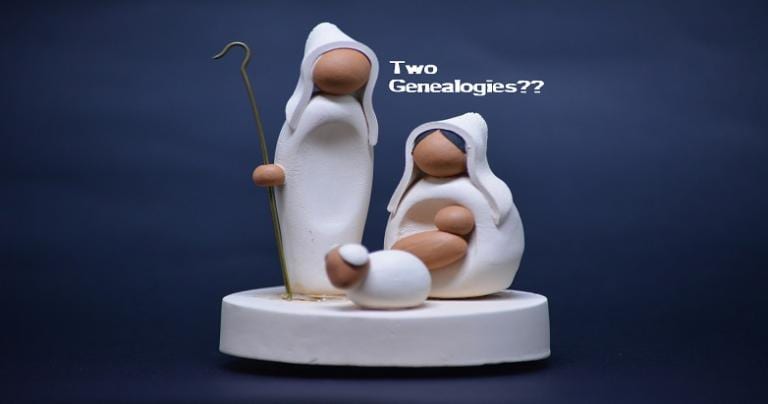
Genealogies in the Gospels, hardly factual, are about establishing Jesus’ honor, not his actual patrilineal descent.
Genealogies are hardly the most exciting topic for American Bible readers. But our Middle Eastern ancestors in the faith delighted in them. Understanding them helps ground our Christmas Bible readings.
Last time, and over several posts in this series, we have raised serious doubts about the historicity of the two infancy narratives found in Matthew 1—2 and Luke 1—2. Stories of births and childhood accounts in antiquity served a different purpose than do our American reminiscences over family photo albums. This can be seen clearer when we turn attention to the two genealogies given by “Matthew” and “Luke.”
The Gospels offer us two genealogies of Jesus (really of Joseph), one in “Matthew” (1:1-17) and the other in “Luke” (3:23-38). Neither “Mark,” the first Gospel, nor “John” have genealogies. It is often wrongly claimed that the Lukan genealogy is of Mary, but that is evidently false. Since the thrust of this series of blogposts is on the Infancy Narratives, we will be spending more time on the genealogy of Jesus given in “Matthew.” This genealogy does not agree with the one in “Luke” which is placed outside the Lukan Infancy Narrative. Both genealogies present huge difficulties.
Looking Closely at the Genealogies
By examining these genealogies Western Christians realize that denying either or both of the Infancy Accounts as historically precise and accurate is not wanton skepticism. Consider the images below—
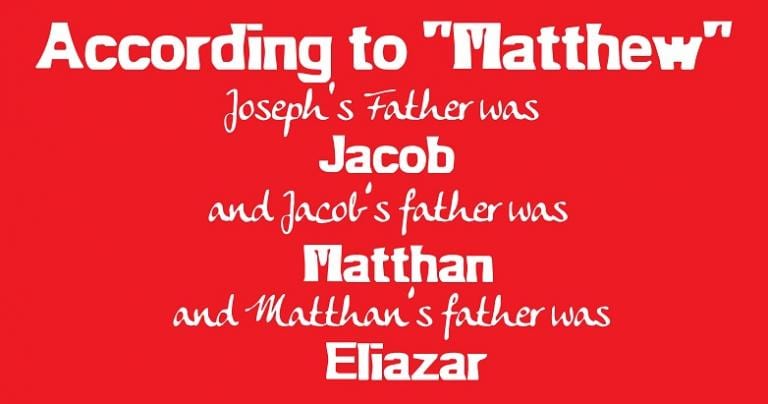
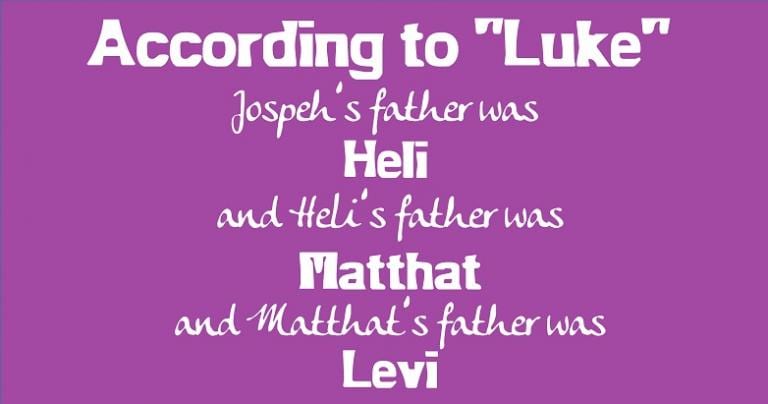
Here we have three generations preceding Jesus. Notice that the genealogy in “Matthew” disagrees with “Luke” about who the paternal grandfather is. In the Matthean genealogy the paternal grandfather of Jesus is Jacob, whereas the Lukan genealogy says it was Heli. “Matthew” says Jesus’ great grandfather was Matthan whose father was Eleazar, but “Luke” says it was Matthat fathered by Levi!
Many disagreements like these can be found going back to King David. Open up your Bible and see them. Did Joseph descend from Solomon? “Matthew” says so. Or was David’s other son, Nathan? “Luke” says so. It can’t be both! Who is right? Who is wrong? Could it be that both evangelists simply didn’t have correct information concerning Jesus’ paternal line? Could it be they drew from sources who invented the names, or borrowed from acknowledged Davidic lines? Was someone inventing stuff?
Understanding Ancient Genealogies
Genealogies in antiquity were not like what you get from a membership to Ancestry.com. As we explained before, accounts of birth and childhood in antiquity were only scribed after a person died and became famous! The same thing can be said of ancient genealogies. Just as no one remembered (or cared to remember) someone’s childhood, the same was with an ordinary person’s genealogy. But should an ancient person die and then become famous, it might be time for a “stereotypical” genealogy to be crafted!
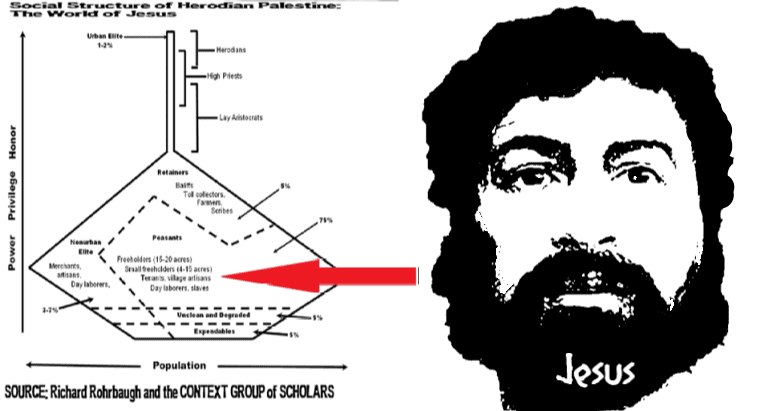
Consider the peasant artisan turned folk healer, Jesus. Everyone knew through the gossip network his lowly status and shameful origin—his mother was pregnant before living with her husband. He began a political movement that wasn’t all that remarkable in comparison with other messianic figures in Israel of the first and second century, CE. And he died by a shameful execution, as the public degradation ritual of crucifixion was reserved for only the worst criminals. But that was not his end, was it? Shortly after he died, Jesus was witnessed by many alive and raised.
The followers of Jesus grappled with this. Only the God of Israel had mastery over death. So God must have raised Jesus up. But God would never do that for someone shamefully reprobate! God rewards the righteous by taking them up into sky vault. Indeed, the Risen Jesus was communicated to these visionaries as cosmic Lord and Messiah, soon to return to inaugurate theocracy in Israel. Therefore, Jesus had been honored by God and given unimaginably high status in reward for his undying Mediterranean-style loyalty (faith, Godfather-style).
Genealogies about a Mediterranean “Lowlife”
What does this add up to? That Jesus would be deemed a Mediterranean “lowlife” given his shameful peasant origins, his high honor rating (“son of God”??!!), seemingly bizarre and outlandish, would have to be spelled out. Understand that to ancient Mediterranean peoples, like begets like. That means great ones give birth to great ones, and lowly peasants beget lowly peasants. What shocked all ancient peoples was when a lowlife (e.g., Galilean nothing-person Mary) gave birth to a great one! When that rarity occurred it had to be explained! Both irreconcilable genealogies in “Matthew” and “Luke” are meant to do that. Like all biblical genealogies (toledoth), they are honor pedigrees. They spell out Jesus’ honor rating.
Put yourselves into the sandals of Jesus’ first century Mediterranean followers. Everything for these people revolved around honor. Theirs was an honor-shame culture. Ask yourself: why should a lowly Galilean peasant village artisan be made Cosmic Lord and messiah?
These stories and genealogies were not written by, for, or about Americans. The purpose of each genealogy—and the childhood accounts!—is not primarily to give factual, biographical information about Jesus. Instead each is a deliberate attempt to glue Jesus into an honorable family group which owns tremendously honorable foundations in the past. This hopefully will showcase something of what people might expect of the real Mediterranean hero, Jesus.
Genealogies and the Definition of Honor
As we have said before, of all basic things Western Christians need to learn concerning the Bible, honor and shame are primary. Failure to understand these two basic social values and it is impossible not to distort the Bible.
Honor means the public claim, whether by person or group, to value and the society’s acknowledgement of that claim.
Shame or dishonor means failure or refusal to acknowledge the public claim. It correlates with honor.
Both genealogies are about honor, Jesus’ honor. They communicate honor, mainly ascribed honor. This is the honor you get just by being born. You receive it at birth without doing anything. The gods or kings or great elites may also bestow this unearned reputation on you. Some powerful figures were capable in the ancient Mediterranean of claiming honor for others and forcing the public to acknowledge their honor—they can thus ascribe honor onto others.
Matthew’s Genealogy
Look at how “Matthew” begins his Gospel. Open up the first page of the New Testament. “Matthew” has manufactured an artificial genealogy for Jesus. Context Scholars like John Pilch and Richard Rohrbaugh explain that if you visit many traditional Middle Eastern villages today and ask anyone for their genealogy, you will only hear three names they truly know. Those consist of their father, their grandfather, and their great grandfather. Going back any farther with surety is not possible—no one has survived who can verify it.
And yet you may also receive still three more names! These three other names will be of ancient patriarchs that everyone in the village or other ingroup would claim as their ancestors. In the case of Israelites like Jesus, these would be Abraham, Isaac, and Jacob. And if they sing you a song of so many other names in-between? These are certainly made up.
So back to “Matthew” and his genealogy. Keep in mind he wants to tell his audience the great honor of Jesus. But how? He manufactures an artificial genealogy of three sets of fourteen generations. Why? He gives Jesus a contrived set up of three sets of fourteen generations because he wants to link Jesus closely with David. They run between Abraham to David which equals fourteen generations. Then from David until the captivity in Babylon, also fourteen names/generations. And then from Babylon down to Jesus again fourteen names/generations.
Why the Fuss with Fourteen??
Why does “Matthew” emphasize the number fourteen? It is because fourteen to ancient Israelites means “DAVID.” How can that be? Unlike us, ancient people did not have spare alphabets available to appropriate as symbols meaning number values. We Western people enjoy that luxury. Not so ancient Mediterraneans. Thus, their alphabets had to work double as their number system. Look here at the Hebrew alphabet—
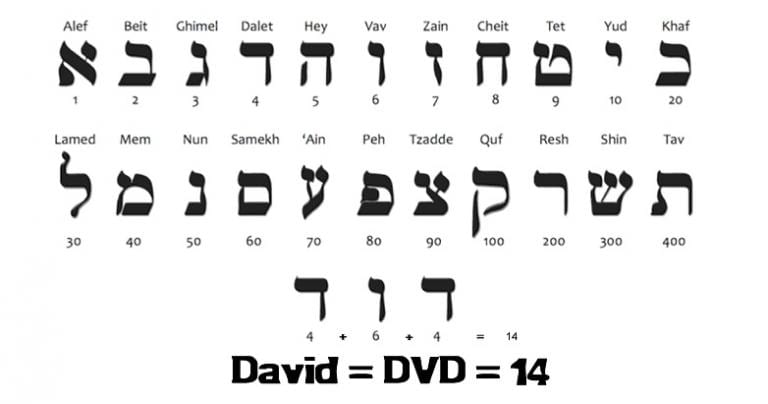
What this means is that by a process called gematria names and words are also numerical sums. Since all the letters bear a numerical value, then you can add up the letters of any word and you get a sum, a number that represents the word or name. Well, the Hebrew form of “David” is DVD. Thus, D = 4 and V= 6: DVD = 4 + 6 + 4 = 14. Therefore, David’s name in Hebrew adds up to fourteen. What “Matthew” is trying to say is that Jesus bears the honor rating of King David—don’t worry about him being a nothing-person from a nothing-place in worthless Galilee, okay?
So the way “Matthew” presents it, Jesus can trace his lineage, and hence his honor, to King David. David is the source of Jesus’ family honor! So “Matthew” is telling his audience don’t be dismayed by the lowly peasant origins of Jesus! He is not some lowlife construction worker! Jesus is really the Son of David.
Jesus, the Heir of Abraham
But “Matthew” illustrates it is even better. The source of David’s honor is Abraham himself! David does not stand at the head of the genealogy; he is not the apical ancestor. The first and greatest of the patriarchs, Abraham, is the head of the Matthean genealogy of Jesus. God promised Abraham children, land, and great honor. “Matthew” mentions David as the head of the second list of names, which contextualizes Jesus as “son of Abraham” in light of him being “son of David.”
Throughout this gospel, the Matthean Jesus is continually rejected as king (Matthew 21:15-16; 27:42). But they are blind to Jesus’ royal lineage—his ancestors include Solomon, and David.
For ancient peoples genealogies had many various purposes. And as purposes changed, so too the genealogy would necessarily change to better help the situation at hand. “Matthew” needs to establish right off that the lowly Jesus of Nazareth is really son of David, son of Abraham (Matthew 1:1-17).
Luke’s Genealogy
“Luke” had similar purposes to “Matthew.” He also needs to establish Jesus’ honor, a difficult accomplishment given Jesus’ lowly and shameful beginnings. Again, “Luke” does not include his genealogy in his infancy narrative (Luke 1—2). Rather, he places it just after the voice from sky vault proclaims Jesus as the beloved and pleasing Son (Luke 3:23-38). Again and again “Luke” repeats “son of,” echoing the voice from sky vault. This underlines God’s own testimony concerning Jesus.
Again all ancient Mediterranean genealogies were claims to honor. The longer the genealogy, the greater the honor. Like every Gospel, “Luke” is making an outlandish social claim—a lowly peasant is son of God! Certainly this claim must be challenged, but “Luke” uses the following section in his Gospel (Luke 4:1-13) to quickly verify this seemingly bizarre claim, otherwise he may lose his audience!
Since the claim made by the Lukan genealogy—that the lowliest of peasants is raised to the status of son of God spanning the entire human race!—is so outlandish, it must be verified through an honor test. But this honor claim must be challenged by an adversary beyond the match of any mere peasant. This is why “Luke” places the Temptation narrative immediately following his genealogy.
Genealogical Honor Claim & the Satan
When you look closely at the document called “Luke,” you see that Luke 3:1-2—introducing John the Baptist’s movement—sounds like it could have been the beginning of the text. After all, “Luke” follows “Mark,” a Gospel lacking an infancy narrative and beginning with John the Baptist (Mark 1:1-8). Infancy Narratives were afterthoughts. Maybe the Lukan Infancy Narrative (Luke 1—2) was an addition to the original version of “Luke”? Following Mark 1:9-13, the audacious claim from sky vault that Jesus is son of God comes at his baptism with John. The Temptation narrative, Jesus’ honor test, must follow this to back up the claim.
The final phrases of the Lukan genealogy identify Jesus as the son of Adam, the son of God—the same thing as the voice from the sky vault proclaimed at Jesus’ baptism. Western people reading these genealogies need to keep in mind their primary purpose: validating someone’s social status, his honor rating. Therefore genealogies could be and were regularly re-written to this end. This is demonstrated by the two very different and irreconcilable genealogies from “Matthew” and “Luke.”












